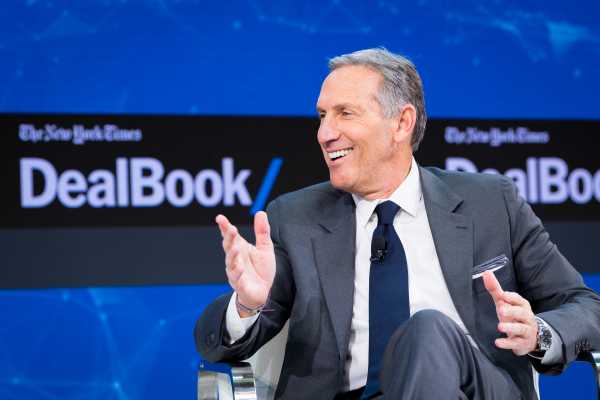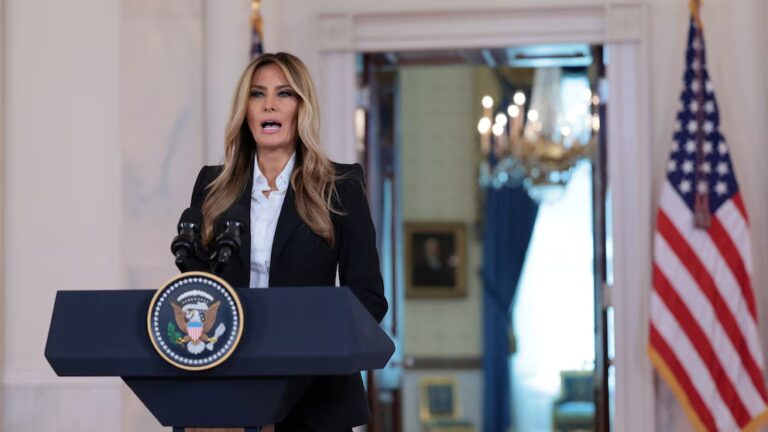
Former Starbucks CEO Howard Schultz has been toying with the idea of running for president, and over the weekend, he finally pulled the trigger — sort of.
Schultz, 65, in an interview with 60 Minutes that aired on Sunday said he is “seriously thinking of running for president.” He said he will run as a “centrist independent,” though he describes himself as a “lifelong Democrat,” and given his $3.5 billion net worth, he would likely be able to self-fund his campaign.
The announcement has roiled Democrats, who worry that an independent candidate could split the vote against President Donald Trump and help him win a second term.
Schultz doesn’t seem too worried about it.
“We have a broken political system with both parties basically in business to preserve their own ideology without a recognition and responsibility to represent the interests of the American people,” he said in an interview with the New York Times.
He said running as a Democrat would be “disingenuous” because he doesn’t believe in some of the issues that many in the party (and certainly many 2020 contenders) support — free college, universal free health care, and guaranteed jobs. He said on those matters, the party “has shifted so far to the left.”
Schultz now plans to tour the country for the next few months, in part to promote his new book, From the Ground Up, and during that time will decide what to do. Trump has already taken notice of his potential competitor, tweeting on Monday morning that Schultz doesn’t have the “guts” to run and making bizarre claims that he hopes the Starbucks in his New York City Trump Tower is still paying rent.
Trump also homed in on Schultz’s remark during the 60 Minutes interview that he’s not “the smartest person in the room.” (Schultz said it in the context that he surrounds himself with smart people.) Trump said he agrees with Schultz that he isn’t the smartest, and added, “Besides, America already has that!” — seemingly inadvertently confessing that he isn’t the smartest, either.
Howard Schultz’s biography — and history of political aspirations — briefly explained
Schultz, like Trump, is a native New Yorker and was born in Brooklyn in 1953. He became the first person in his family to graduate from college when he graduated from Northern Michigan University in 1975, and after a few odd jobs in between, he landed at Starbucks in 1982.
Starbucks is what brought him his fortune and fame — he bought the company in 1987 and oversaw its expansion to more than 28,000 stores in 77 countries around the world. He stepped down as CEO in 2017 and in 2018 stepped down as chair. He now holds the honorary title of chair emeritus.
Schultz has had political aspirations for quite some time. His friends reportedly urged him to join the Democratic presidential primary in 2015, but he decided against it. He told Time that year that he didn’t see it as a “solution” and the next year said he believed that he could do more as a private citizen and CEO than as a politician. He backed Hillary Clinton in 2016.
But since then, he’s become increasingly publicly interested in political life. He’s been critical of Trump, in 2017 accusing him of “creating episodic chaos every day.” In response to Trump’s travel ban, Schultz announced that Starbucks would look to hire 10,000 refugees. He went to Houston after Hurricane Harvey, and in the wake of racist violence in Charlottesville, Virginia, he penned an op-ed calling on “better angels” to rise to the defense of others.
In an interview with the Times last summer after stepping down as Starbucks chair, Schultz said he had been growing “deeply concerned about our country.” He said he wasn’t sure about running for president — and, given his recent comments, he still isn’t, though he’s moving closer to it.
He did suffer a setback in 2018 after an incident at a Philadelphia Starbucks when two black men were arrested for doing, essentially, nothing. Starbucks and Schultz engaged in a big public mea culpa, holding anti-bias training in all of the chain’s stores and changing the coffee company’s bathroom policies.
Schultz would position himself as the self-funded man in the middle
Schultz’s theory of the case seems to be that both the Democratic and Republican parties have moved too far to the left and the right and what America is really craving is an economic centrist and former business executive.
In his 60 Minutes interview, Scott Pelley ticked off a number of issues and asked Schultz for his opinions on them.
Some of Schultz’s responses sound like pretty typical Democratic positions. Immigration? The US is a country of immigrants, and there should be a “fair and equitable way” for unauthorized immigrants in the US to become citizens. Climate change? It was a “tremendous mistake” for Trump to pull the US out of the Paris climate agreement.
Other positions Schultz takes demonstrate why he might have a hard time gaining traction in a Democratic primary. He said he believes everyone “deserves the right to have access to quality health care” but said free health care for all is unaffordable. “What the Democrats are proposing is something that is as false as the wall,” he said.
Schultz criticized the 2017 Republican tax cuts for giving a “free ride to business” and said he would have been “more modest” in giving tax relief to those who need it the most. In an interview with CNBC on Monday, he said he didn’t want to get into details on whether he would raise taxes on corporations, which in the 2017 bill got a cut from a 35 percent rate to 21 percent.
“I don’t want to talk in the hypothetical about what I would do if I was president,” he said.
In the Times interview, he expressed concern about the national debt and the affordability of free college and guaranteed government jobs.
“Doesn’t someone have to speak the truth about what we can afford while maintaining a deep level of compassion and empathy for the American people?” he said.
It’s not clear whether there’s an appetite for a potential Schultz presidential bid. No independent candidate has ever won the White House.
In both the Times and 60 Minutes interviews, Schultz pointed to a Gallup poll showing that more than 40 percent of Americans identify as independents. “Their trust has been broken. And they are looking for a better choice,” he told Pelley.
A lot of people aren’t thrilled about this
The big question about Schultz’s potential presidential bid is … who wants this?
Democrats — and even many anti-Trump Republicans — have fiercely criticized Schultz’s potential run. They say he risks splitting the anti-Trump vote and getting Trump reelected.
“The only good news [Trump] received in an otherwise dismal week: The prospect of a well-funded independent candidate to dilute the opposition in 2020,” former Obama adviser David Axelrod tweeted.
Schultz running as an independent would be a “catastrophic mistake,” Matt Bennett, co-founder of the center-left think tank Third Way, told the Daily Beast. “Just don’t,” Tina Podlodowski, chair of Washington state’s Democratic Party, told the Times of Schultz’s plans.
A number of prominent political figures and pundits weighed in on Schultz on Twitter, and the reaction was largely negative.
Schultz started a Twitter account on Sunday, and many of the replies to his initial tweets were people telling him not to run.
Some of the lessons of Trump’s presidency may undercut Schultz’s argument as well: namely, that it’s good to have a businessperson in the White House. Trump’s experience in the corporate world certainly hasn’t translated well to his presidential success.
Of course, it doesn’t much matter what people think of Schultz running for president — not only other politicians and pundits, but pretty much anyone. Because Schultz can self-fund his campaign (he told Pelley he will be “fully resourced to do what’s necessary”), he doesn’t need buy-in from donors big or small.
He’s not the only candidate weighing a self-funded campaign — Michael Bloomberg, who would run as a Democrat, would pay for his own bid as well.
Thus far, Schultz doesn’t seem worried about the criticism and still plans to test the waters on a potential bid. This week, he will head out on a tour, with stops in New York, Arizona, Washington, and California. And he’s brushing aside criticism.
“I’m not considering this to win the Twitter primary,” told Axios. “I believe that lifelong Democrats and lifelong Republicans are looking for a home, and they’re not spending hours and hours on Twitter.”
Sourse: vox.com






